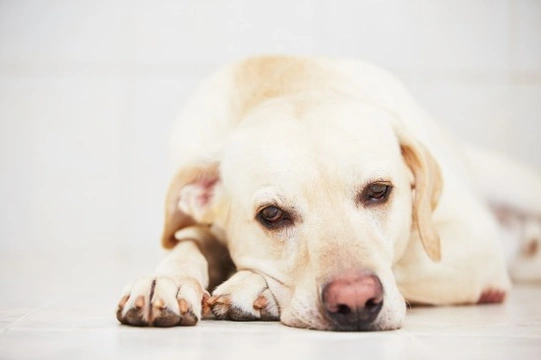
What is Polyradiculoneuritis in Dogs?
Luckily polyradiculoneuritis in dogs is a rare yet devastating condition that is very similar to Guillain-Barré syndrome in humans. It is a condition that's poorly understood but which many believe is caused by a dog's immune system attacking its own nervous system by mistake. This mistake happens due to the molecular structure being too similar to those present in viruses or bacteria which might have recently been present in the dog's system.
Also known as Coonhound Paralysis, polyradiculoneuritis is known to be an acute neurological disorder seen in dogs which affects the nerves that control muscles found in both their fore and the hind legs. It also affects the nerves in their necks and muscles which play a crucial role in their breathing and barking ability.
The Causes of Polyradiculoneuritis
Although the actual cause of the condition is obscure, it is thought that polyradiculoneuritis is associated with an over stimulation"" of the dog's immune system. This could be brought on by some sort of stimulating agent which could involve a vaccination or the condition might be triggered by a viral respiratory infection. It could even be brought on by a bacterial or viral gastrointestinal infection.
Symptoms & Signs to Watch Out For
If you notice your dog has a stiff or stilted gait in all four of their limbs which very quickly appears to get worse and this is accompanied by weakness and/or paralysis it could be an indication there is a problem. You might also notice their voices seem altered or they may have totally lost their voice which again could be early signs there is a serious problem going on and you would need to get your dog to the vet as a matter of urgency.
Other symptoms to watch out for could include the following although these could be evident although to a lesser extent:
- A weakness in their facial muscles
- Drooping lips
- Sagging eyes
- Expressionless face – vacant expression
Your dog may begin to have real trouble breathing which could even lead to them not being able to breath at all which is why it is so important to get them to a veterinary surgery as a matter of urgency. The condition could have been going on for anything from four to five days or sometimes up to 10 days before things appear to stabilise, but then the condition will gradually get worse resulting in a lot of weight loss and muscle wastage.
The condition is really strange because although a dog's mobility might be severely restricted or where total paralysis takes hold, a dog does however, remain quite happy and will continue to be responsive to their owners. They will be able to eat and drink quite normally and if given the opportunity, they are able to both defecate and urinate. With this said, in the first few days of this disease taking hold most dogs will be reluctant to do any of these things which could be because they are confused about what is going on and not because they cannot.
Diagnosing the Condition
There are no routine blood tests available to determine whether polyradiculoneuritis is present in a dog's system. However, there are more sophisticated tests that can be done to confirm the diagnosis but which need to be carried out by a neurology specialist who will test a dog's nerves and muscles by carrying out a biopsy or they may want to do a spinal tap.
Treatments for Polyradiculoneuritis
Sadly, there are no drugs available to treat this rare condition although high doses of immunoglobulins have been seen to shorten the course of the disease but this has not yet been proven in dogs and the treatment is extremely expensive. By far the best treatment is careful nursing and physiotherapy. Dogs suffering from the condition would need to lie on a well padded bed and would need to be frequently turned to ensure they are comfortable and to prevent pressure sores from forming.
Dogs with the condition also benefit from swimming where movement of their limbs is passive. But this should only be done when their limbs strengthen up a little but it is a great way for a dogs to have the right type of stimulation which results in improving muscle strength and to avoid muscle wastage.
The Prognosis
Luckily, the prognosis is thought to be good to excellent with the majority of dogs making a full recovery from the condition. However, dogs that have had to endure a severe case of polyradiculoneuritis might continue to suffer mild but permanent neurological issues. The thing that all dog owners need to understand is that if their pet does suffer this condition, it could take months for them to recover and therefore a lot of patience, love and careful nursing has to be given a dog during this entire time. Dogs sadly do not build up a resistance to this nasty condition so they could suffer a recurrence if they were to be exposed to the same agent that caused the condition in the first place.
""



